Intel Core i7-9700K 9th Gen CPU Review: Eight Cores And No Hyper-Threading
Why you can trust Tom's Hardware
Conclusion
Intel’s decision to arm its Core i7 line-up with eight cores makes sense, given a new eight-core, 16-thread Core i9-9900K flagship. But of course, the company had to pare its Core i7-9700K back to keep it from nipping at the i9-9900K's heels. Gone is Hyper-Threading, along with a bit of L3 cache. Nevertheless, two extra cores, higher Turbo Boost frequencies, and solder-based thermal interface material all combine to facilitate better performance in lightly- and heavily-threaded workloads compared to Core i7-8700K.
In the chart below, we plot gaming performance using average frame rates and a geometric mean of the 99th percentile frame times (a good indicator of smoothness), which we then convert into a frame-per-second measurement. Bear in mind that we tested with a Nvidia GeForce GTX 1080 at 1920x1080 to alleviate graphics-imposed bottlenecks. Differences between our test subjects would shrink at higher resolutions.
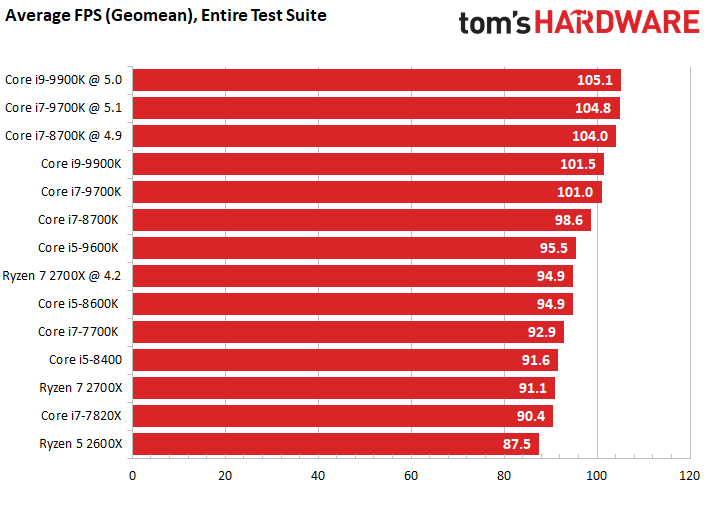
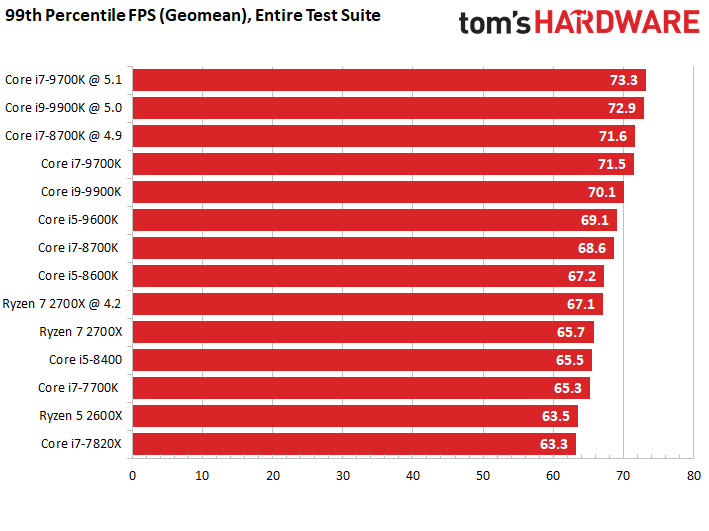
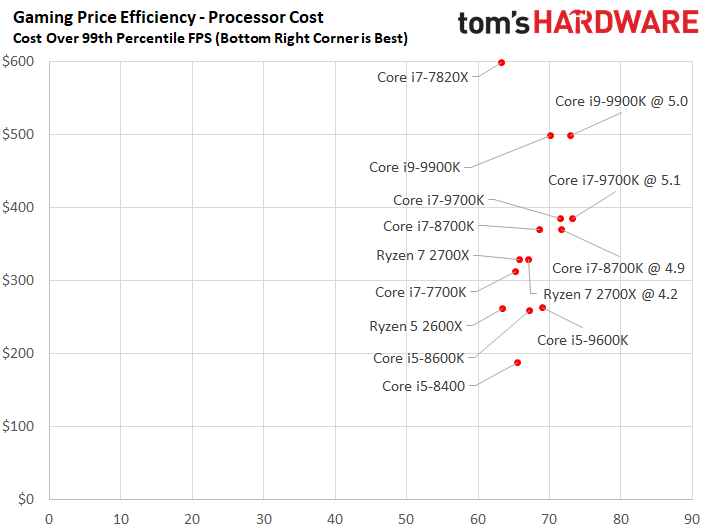
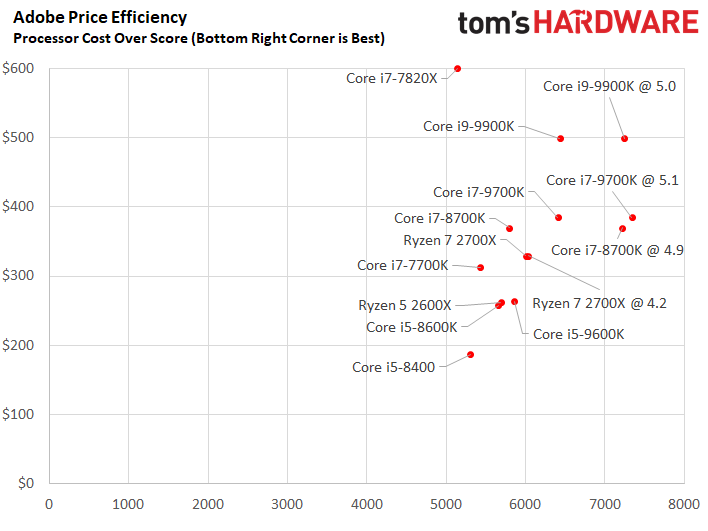
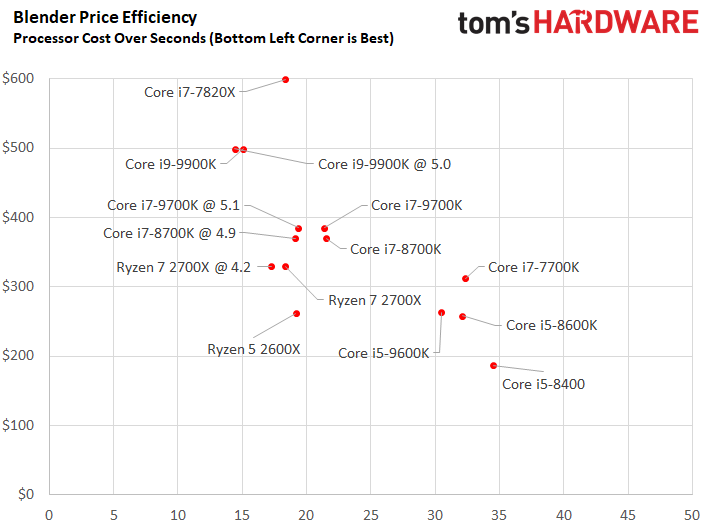
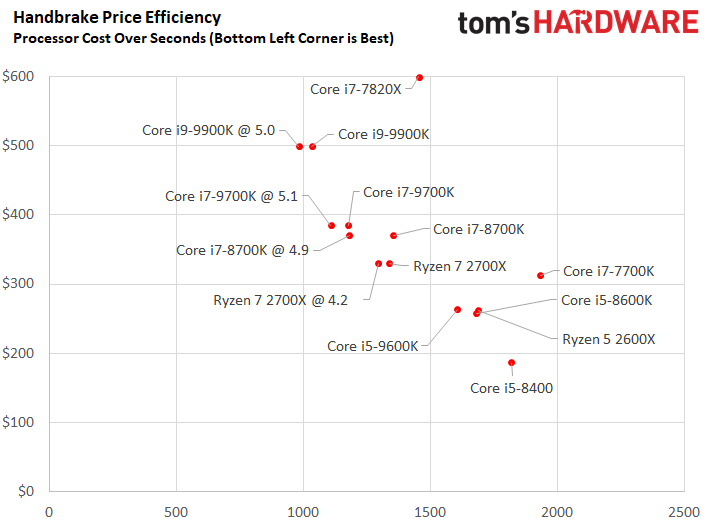
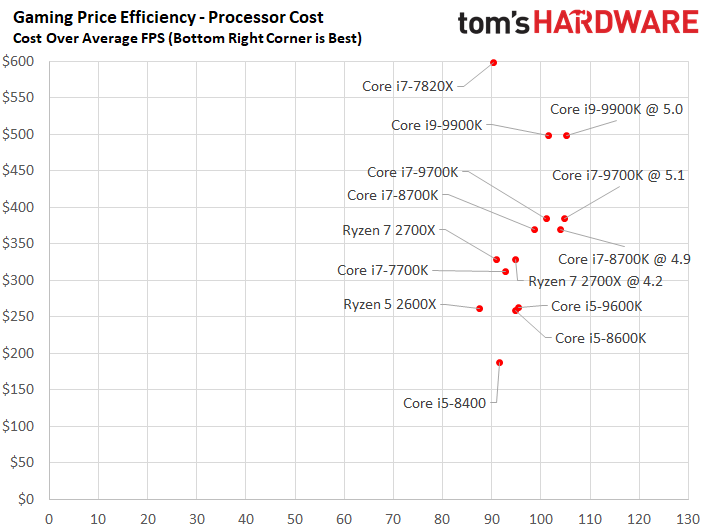
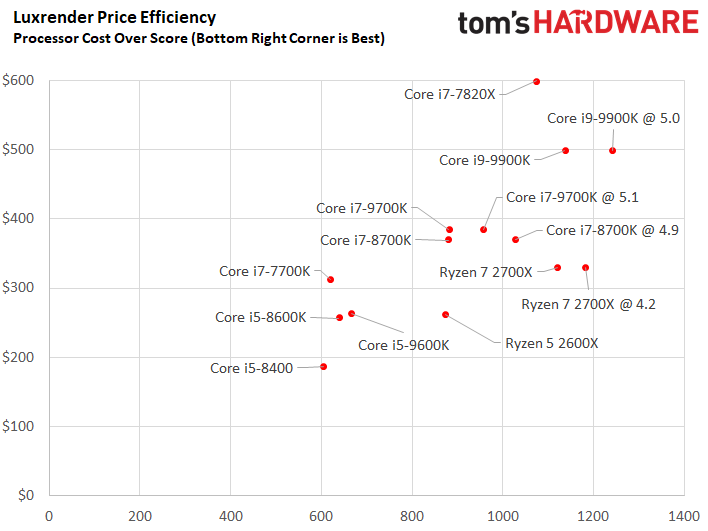
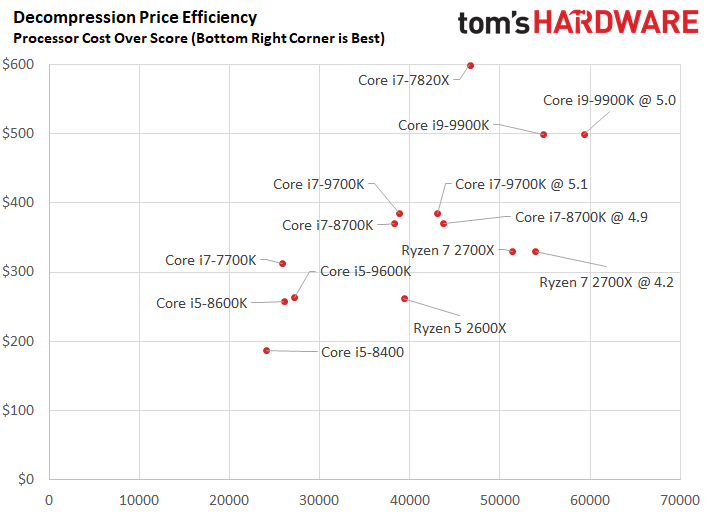
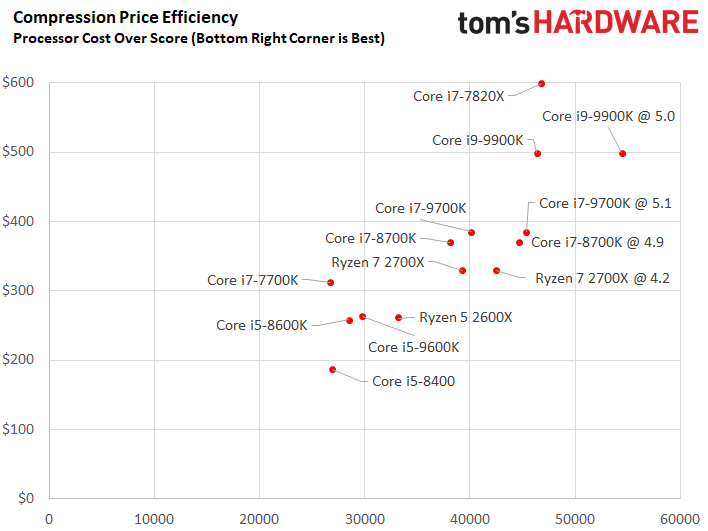
As you can see, Core i7-9700K and Core i9-9900K are very similar when it comes to gaming. You certainly wouldn’t notice a difference between them in the real world at 2560x1440 or 3840x2160. Intel's Core i7-9700K certainly has enough horsepower to push the fastest graphics cards available. Saving a bit of money by skipping the -9900K, the expensive motherboard you need to drop it on, and super high-end cooling should help fund a better graphics card.
Intel’s Kaby Lake and first-gen Coffee Lake processors excelled in gaming benchmarks and lightly-threaded application workloads due to compelling per-core performance. But the arrival of AMD's Ryzen forced Intel to reconsider its strategy. Ryzen’s big core counts and inclusion of simultaneous multi-threading translated into substantial advantages in parallelized tasks. Today, Core i7-9700K's eight cores and aggressive Turbo Boost frequencies narrow the gap. Ryzen 7 2700X is still a great CPU for heavily-threaded applications, but its lead isn't as large. Moreover, the -9700K maintains a commanding lead in single-threaded apps, making it a well-rounded performer.
The Core i7-9700K’s extra on-die resources and higher multi-core Turbo Boost frequencies are enabled by Intel's solder-based thermal interface material. This STIM also helps relax the chip's cooling requirements, making it possible for a heat sink and fan to handle stock operation. High-end closed-loop liquid coolers should provide enough headroom for most overclocking efforts. And unlike Core i9-9900K, you don't need to sink big bucks into a premium power supply.
AMD's Ryzen 7 2700X remains competitive, particularly in measures of performance per dollar (value). Core i7-9700K is faster in games, but again, the 2700X should provide a similar experience if you match it up to a mid-range graphics card or run at the high resolutions that bottleneck even top-end GPUs. Ryzen 7 2700X is also attractive for builders with limited budgets, who want to spend the money they save on a gaming card on the higher-end of the GPU hierarchy.
Core i7-9700K doesn’t warrant an upgrade if you already own an -8700K or even -7700K. But if you're building a new PC, there's no reason to compromise by seeking out the older Core i7-8700K. To be sure, Intel's Core i7-9700K is the new mainstream performance leader for enthusiasts with money to spare. If heavily-threaded productivity applications are commonplace on your desktop, there might be reason to invest in Core i9-9900K. Otherwise, avid gamers and overclockers will find Core i7-9700K to be a well-balanced chip that doesn’t disappoint.
Get Tom's Hardware's best news and in-depth reviews, straight to your inbox.
MORE: Best CPUs
MORE: Intel & AMD Processor Hierarchy
MORE: All CPUs Content

Paul Alcorn is the Editor-in-Chief for Tom's Hardware US. He also writes news and reviews on CPUs, storage, and enterprise hardware.
-
rantoc Considering the amonth of security flaws that have been found lately the lack of HT could become a blessing in the end!Reply -
logainofhades I would like to see a locked at same clocks review, for these CPU's. It seems you really have to push Intel, to handily surpass AMD. It reminds me of the FX vs Sandy bridge days.Reply -
ingtar33 Well I just went from an I5-4690K to an AMD Ryzen 7 2700 after seeing the price of intel's current lineup, and knowing that Ryzen2 is coming in another 6mo or so. Personally I thought it was a no brainer, since the 7 2700 could be had for $260, mine is in an mitx build right now with a little Kracken M22 cooling it, and as I type on it it's currently plugging along at 4.2 ghz with DDR4 3600 ram in it.Reply
What point am I making? Well, the motherboard, cpu cooler and cpu combined were cheaper then this i7 in this review. chew on that. And remember that ryzen2 should be out sometime in the spring of 2019, and it will be completely compatible with everything I just purchased while being on par with or even faster then this last intel chip.
Now that you've chewed on that for a bit, ask yourself "why did THG stamp an editor approval on this chip again?" We probably should, "Just buy it," I guess, and not ask so many questions. -
ingtar33 Reply21463450 said:I would like to see a locked at same clocks review, for these CPU's. It seems you really have to push Intel, to handily surpass AMD. It reminds me of the FX vs Sandy bridge days.
except that's not what we're seeing. 105.5 fps vs 94.9 fps is 10.4%, a 10.4% improvement for the 8c16t intel core i9-9900k. yet the chip is running at 5.0ghz vs the 8c16t ryzen 7 2700x at 4.2 ghz, which means the intel is clocked about 19.0% faster then the AMD to get a 10.4% lead in FPS.
These Intel cpus DO NOT have higher IPS then Ryzen. If anything, assuming there isn't some sort of scaling issue in the testing suite, this seems to indicate that intel's cpus have moderately less IPS then AMD Ryzen+ and are currently getting by with clock speed alone. Which means this is as far away from sandy bridge vs fx then we could get. Sandy bridge didn't just clock to 5ghz, but was sporting almost 40% better IPS then Piledriver FX cpus. -
InvalidError Reply
You are getting product and code names confused. Ryzen 2 (Zen+) has been out for over six months already and your new Ryzen 2700 is one of those. Ryzen 3 (Zen 2) is what's coming out in 2019 on 7nm.21463471 said:And remember that ryzen2 should be out sometime in the spring of 2019 -
adam.oakes83 INGTAR33, you can't just make up results and claim tReply
It to be proven actuate by doing a math equation. 99.99% of the internet making claims with no source to back it up. -
TerryLaze Reply21463503 said:except that's not what we're seeing. 105.5 fps vs 94.9 fps is 10.4%, a 10.4% improvement for the 8c16t intel core i9-9900k. yet the chip is running at 5.0ghz vs the 8c16t ryzen 7 2700x at 4.2 ghz, which means the intel is clocked about 19.0% faster then the AMD to get a 10.4% lead in FPS.
These Intel cpus DO NOT have higher IPS then Ryzen. If anything, assuming there isn't some sort of scaling issue in the testing suite, this seems to indicate that intel's cpus have moderately less IPS then AMD Ryzen+ and are currently getting by with clock speed alone. Which means this is as far away from sandy bridge vs fx then we could get. Sandy bridge didn't just clock to 5ghz, but was sporting almost 40% better IPS then Piledriver FX cpus.
This only works if you don't know CPU and GPU utilization.
Looking at a lot of gaming benchmarks even the i3/pentiums/2400g etc are only 10-20% below the 9900k because gaming benchmarks are made to push the GPUs and not the CPUs so the GPUs bottleneck way before the CPUs,and even if they don't, scaling in games means that slower CPUs can just use more threads to get to the same FPS.
Look at CPU benchmarks the deficit the ryzen CPUs have there is still there in gaming it just shows in the utilization where the ryzen cpu will have 30-40% more utilization (2700x vs 9900k) . -
Dantte PCgamers did some testing delidding a 9900K and determined that the solder TIM does NOT provide any additional cooling when compared to a 8700K because the die is much thicker (about 32% thicker) and hampers the transfer. Also the solder is too thick as well.Reply
They tested and proved this theory by delidding and replacing the solder with conductonaut and got a 8C decrease in temps. Then they lapped the die -.15 and -.20mm and retested which came back with even lower results. -
t99 Glad I went with a 2600 for only 150$ new and just OC if needed. Basically a 2600x and the avg is within 20% of an OC'd 9900k and 10% of 8600k.Reply
When you account for the difference in cooling and motherboards as well you can get a 2600 + 1070ti for price of a 9700k.
Maybe we will see larger gaps with the new intel when they test 1080p on a 2080. So glad I didnt wait and go with one of these